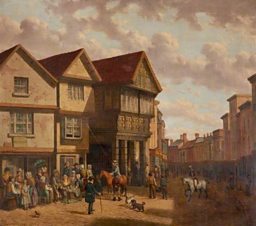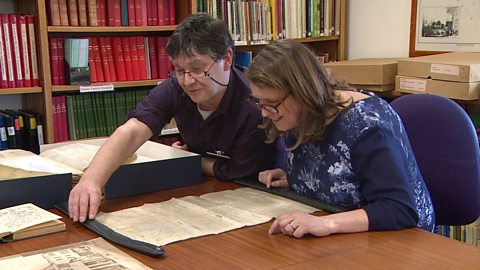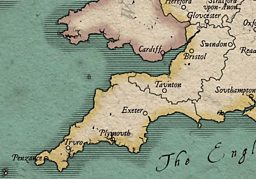The King's Men perform in Barnstaple to escape London's plague
In Shakespeare’s day, Barnstaple, situated on the estuary of the River Taw, was the most important town on the north coast of Devon.
With wealthy merchants and a flourishing port, it was apparently worth the trip for the Bard and his royal players following a circuit along the north coast from Somerset.
-
![]()
Much ado near me
Hear more Shakespeare stories on BBC Radio Devon
-
![]()
Shakespeare Festival 2016
The BBC celebrates the genius of the bard


The King's Men in Barnstaple
BBC Spotlight's Sophie Pierce finds out more about why the players came to the town
The King’s Men had recently become the official royal acting company when the new King, James I gave them the privilege of his patronage in 1603.
The King’s Men had recently become the official royal acting company when the new King, James I gave them the privilege of his patronage in 1603
It was a great honour, and not long after this esteemed company, for whom Shakespeare wrote most of his plays, the King’s Men went on the road. It is very likely they did so with Shakespeare in their company, and they visited Barnstaple twice early in their career.
We know this because two payments were recorded by the authorities, 'the Barnstaple Receivers', the first in 1604-5 for 10s, and the second in 1607-8, for 20s, the latter amount an indication of their higher status. By comparison, other playing troupes such as the Queen’s players and the Earl of Derby’s players received half that reward the same year.
Their most likely performance venue – performing as they normally did before the mayor and corporation - was the timber-framed Tudor Guildhall, standing near St Peter’s Church on the High Street.
The hall had formerly been used by the St George’s Guild and remained in use until the early 19th century when it was demolished and a new town hall built on a different site. A historic plaque marks the site of the former Guildhall. A charming painting of the guildhall by Richard Sharland shows us what it looked like just before its demolition.
Although the records do not show what was being performed, new plays that could have been in the touring repertory in 1604-5 include Measure for Measure and Othello (both performed at court in 1604) but some of Shakespeare’s most delightful comedies, such as Twelfth Night and As You Like It, would also have been appealing to popular audiences in the provinces.
Why were the King's men in Barnstaple?
Not long after King James had succeeded Elizabeth I as the new King, plague broke out once again in London, delaying his coronation. By the summer, the authorities were recording more than 3,000 deaths a week.
The long outbreak of plague meant that the King’s Men had to maintain themselves by touring through rural England's towns and visiting great housesJames Shapiro
London’s playhouses remained closed in the winter of 1603 and the following spring, re-opening briefly in April 1604 before plague returned in the warmer weather forcing the theatres to close once more until September 1604.
In James Shapiro’s book 1606: William Shakespeare and the Year of Lear (Faber and Faber 2015), the author writes: “The long outbreak of plague meant that the King’s Men had to maintain themselves by touring through rural England's towns and visiting great houses (a royal handout of £30 also helped). Local records of their touring are spotty, but there are payments to them between 1603 and 1605 for performances at Bath, Shrewsbury, Coventry, Ipswich, Maldon, Oxford, Barnstaple and Saffron Waldon.” (pg 27)
So this visit to Barnstaple is part of the King’s Men’s so-called 'Plague Tour', escaping the bubonic plague, partly in fear of their lives, but also in search of a living, as the theatres closed down in the capital.
Shakespeare on Tour
From the moment they were written through to the present day, Shakespeare’s plays have continued to enthral and inspire audiences. They’ve been performed in venues big and small – including inns, private houses and emerging provincial theatres.

BBC English Regions is building a digital picture which tracks some of the many iconic moments across the country as we follow the ‘explosion’ in the performance of The Bard’s plays, from his own lifetime to recent times.
Drawing on fascinating new research from Records of Early English Drama (REED), plus the British Library's extensive collection of playbills, as well as expertise from De Montfort University and the Arts and Humanities Research Council, Shakespeare on Tour is a unique timeline of iconic moments of those performances, starting with his own troupe of actors, to highlights from more recent times. Listen out for stories on Shakespeare’s legacy on your BBC Local Radio station from Monday 21 March, 2016.
You never know - you might find evidence of Shakespeare’s footsteps close to home…
Craig Henderson, BBC English Regions
-
![]()
Shakespeare Lives
The nation’s greatest performing arts institutions mark 400 years since the Bard's death
Related Links

Shakespeare on Tour: Around Devon
-
![]()
Shakespeare's players met with a puritan backlash in Exeter and other parts of Devon
Shakespeare's players becoming unpopular with Puritans
-
![]()
Youthful Tragedian performs Hamlet in Devonport
A warm Devonport welcome for a young Prince Hamlet
-
![]()
Ira Aldridge in Devon
Ira Aldridge plays in Devonport before returning to London
Shakespeare on Tour: Around the country
-
![]()
Whitby, wealth and a Shakespearean bachelor night
The Bachelors of Whitby sponsor a performance of Merchant Of Venice
-
![]()
A new king and rebranded Shakespeare’s players head first for Shrewsbury
James I established the ‘King’s Men’ as his official group of theatre players
-
![]()
Shakespeare's men perform before the King at Wilton in Salisbury
A royal audience in Salisbury
-
![]()
Caludon Castle: Did Shakespeare perform here for ‘Henry the Harmless’?
Was Shakespeare there during the 1593 'Plague Tour'?










